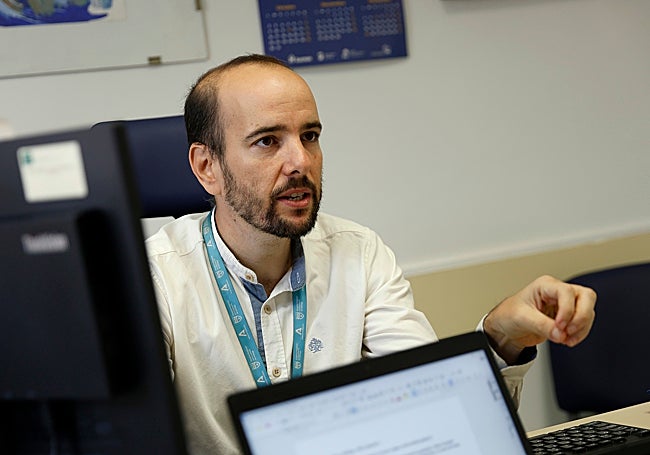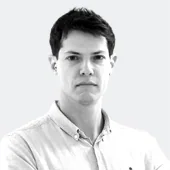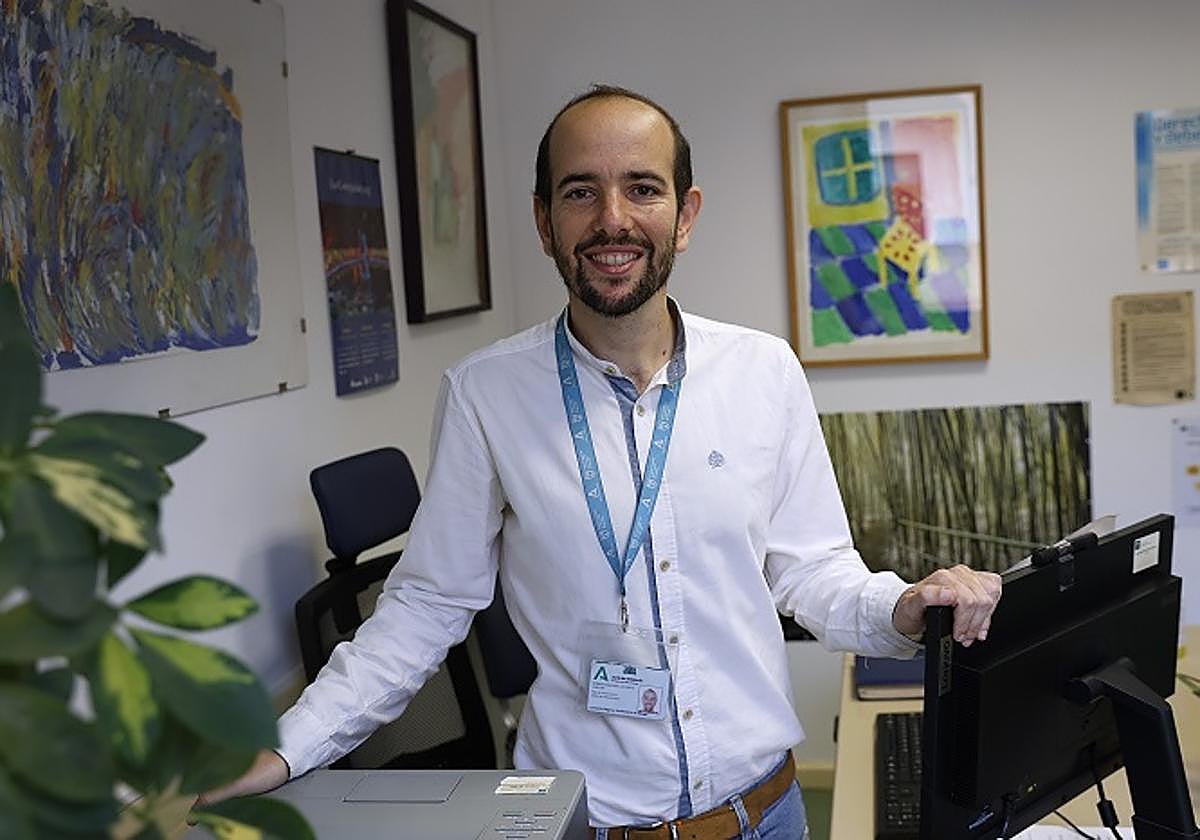Carlos Gómez: 'The use of tranquillisers in Andalucía is the highest in Europe'
He warns of the risk of addiction to mental health drugs and says that old stigmas still persist in pathologies such as schizophrenia, bipolar disorder and severe depression
Mental illness is everywhere, but it is still, in many cases, a taboo. Carlos Gómez is a psychiatrist at the Hospital Civil in Malaga and deals daily with people suffering from depression, schizophrenia, bipolar disorder or suicide risk. He talks to us about the state of mental health of the population in Malaga and the rest of the country.
-Would you tell your colleagues if you had a mental illness?
-No. No, because it has a huge stigma. And I can't recommend any patient to do it. In jobs there is a much greater risk of being fired and in society there is a much greater risk of being rejected. We have improved, but we haven't improved as much as we could.
--Mental health has become a hot topic since the pandemic, and everyone seems to have something. Does society seem to be increasingly affected or is the issue simply being dealt with more openly?
-Mental health has always been latent in the sense that a high proportion of the population, 30% according to studies, has some symptom that constitutes a mental disorder. What happened? The pandemic arrives, everything is communicated on the internet and it comes out that people are ill. Of course, now that we have started to talk, there are more people coming out to ask for help. That generates the imbalance we have between what people are asking for and what we are giving.
- Has the number of diagnoses of psychiatric conditions increased in recent years?
-Diagnoses have increased by almost 40% compared to 2019. Both diagnoses and referrals made by family doctors. The question is to what extent this is an increase due to what is happening and how much is due to changes in the way mental health is perceived.
-Do younger people find it easier to talk about their mental health?
-I think it's less difficult for them, but because communication channels have changed. Many feel more comfortable posting on social media about what is happening to them than coming to a consultation. There is a lot of compassion on social media. You post that you want to commit suicide and you get 300 reactions saying "no, no, no...". But, at the end of the day, these are reactions from people you don't know.
-We see how psychological concepts are part of our conversations: trauma, toxic relationship, toxic masculinity, 'burnout', 'trigger', toxic positivity... Doesn't this trivialise psychiatric illnesses?
-Sometimes belonging to the social language makes us more visible. So what is the balance? If we don't speak, it's bad because we stigmatise. If we speak in a very popular environment, it's also bad. I am very struck, for example, by the fact that one of the most repeated words in reggaeton is "bipolar". Nobody would want to be bipolar like the bipolar people we see.
-Does "depression" conjugate too easily?
-Yes, without a doubt. Not everything that happens in everyday life is depression. And in another way, many people who have depression don't talk about depression.
-Is it a concept that is in a way part of the zeitgeist that we live in?
-Yes, it's almost like it's a life attitude. I lost my partner and I'm depressed. No. You have a partner's grief. The problem is that we insist so much on the word depression that the help we give is not adequate.
-In recent years, have systems that once helped us to overcome certain crises in life disappeared? Take, for example, faith in the church.
-What has mainly disappeared, in my view, is the family. Family networks no longer function. The Catholic faith can be another example, of course. And then there is the issue of the city. The city makes us sick, but we go to the city more and more. And instead of building parks, the debate is whether to build a block of flats or an office block.
-Working hours in Spain, prime-time TV at 10.30pm, the street culture until late at night... Does all this harm us?
-What we know for sure is that sleeping badly messes up your brain. And Spain is one of the countries with the worst sleep. Besides, the pace of life we live now is faster than it used to be.
- Is there a risk of calling conditions mental illnesses when really they're not?
-Maybe we have to consider all these symptoms we are talking about in order to detect the real mental illnesses. I have that doubt. We see that 50% of the people who have a real mental disorder don't go for consultation.
-Are we more willing to ask for help than before?
-I think so. We see it with going to a psychologist. That has already been decriminalised. I would even say it's a bit of a fad.
-Does the male stereotype have a different way of dealing with crises from the female stereotype?
-We see that stereotypes are changing. I would say that the classic male culture does approach problems differently from the classic female culture. Generally, men keep problems to themselves much more and don't access support networks. They try to manage things by themselves. Women are often very receptive to others, forgetting along the way that they have their own problems.
-Is that why the suicide rate is higher in men than in women?
-It is higher in men because men are more impulsive. Of course, when you have two options, to throw yourself from a fifth floor or take a box of diazepam, throwing yourself from a fifth floor gives you a 20 to 30 times higher chance of death. Most women choose diazepam. A few men choose to jump. And what we said before about support networks, men communicate their problems much less.
-Is there a lack of resources in the public health system to treat all the people who need it?
-There is a lack of resources, no doubt. There are not enough psychologists for everyone. In fact, I would say there are only enough for a few. In Malaga we have one of the lowest ratios of psychologists in Europe. There is also a lack of other things. I have a lot of difficulty, for example, in training policemen or firemen in suicide prevention. And who can help better than the first person who finds a kid or an adult with the intention of jumping off a bridge.
- Does that mean that mental health depends on spending power?
-If you want continuous and intensive care, and by intensive I mean two or three times a month, that is not guaranteed by our public system at the moment. So it does depend on spending power and that's unfortunate.
-Is the magnitude of the problem properly assessed?
-Here I would like to make a comparison. A person who has breast cancer at the age of 20 is given everything. I think that's perfect. But a 20-year-old who has a mental health problem that is going to make them work less, be less productive and die earlier is given nothing. Cancer is very serious, but so is depression.
-What defines a depression?
-Generally, it is usually a sustained period of time, at least a few weeks, when we find it difficult to do things. A time when we have anhedonia, i.e. we find it difficult to enjoy things.
-You claim that diagnoses such as schizophrenia or bipolarity are accompanied by stigma. What does the word stigma mean to you in your field?
-It is the impossibility of communicating a health problem as I would communicate other things. With any organic health pathology, a whole range of help is available. At work, for example, they give you a leave of absence without asking. Now, tell them that you have tried to commit suicide... Hey, call human resources to see how much it costs us to fire you. Everyone here asks you not to put the reason for requesting sick leave in the report.
-I'll give you an example. If someone can hold their drink, they are perceived as strong. If you call them an alcoholic, however, it's a different story.
-That's right. It's amazing how many people don't want to be diagnosed as alcoholics because it changes everything. If you can hold your drink, you're a hard guy. If you don't end up messing up, you're even the local hero. Now, if you're told you're an alcoholic, you're a problem.
-So we can't conclude that the terms themselves already harm patients?
-It is true that labels are harmful. But they are the ones that give access to resources. Therein lies the contradiction. For example, if you don't put schizophrenia in the report, they won't give you the non-contributory pension.

Zoom

-Do you feel that a diagnosis of a mental illness at a specific moment weighs like a burden for the rest of your life?
-It depends on the diagnosis, it depends on how you communicate it and it depends on who you communicate it to. Nowadays, you can say I have anxiety and I go to a psychologist. That has improved quite a lot and more or less is taken well by society. But you can't say that you have schizophrenia or that you suffer from depression with psychotic episodes.
-When can one say that someone is cured of a psychic illness? Or is such an illness rather a continuity?
-There is no such thing as black and white. We move through quite a wide scale of greys. The main thing is not having symptoms of the disease for a long time. Generally, we are talking about five years upwards.
-How does social media influence our mental health?
-Social media is killing the imagination and how we treat each other face to face. It distracts a lot from what really matters. If you put the focus on what's happening on social media you don't put the focus on you, which is much more important. Also, we know for a fact that social media fosters addictive attitudes.
- Is there an abuse of drugs in mental health?
-It is complicated. Drugs are not essential in the first place. In general, almost all clinical pathways say that anxiety or depression problems should be treated with psychotherapy. But it is always much easier to give a drug. First of all because there are many more family doctors than psychiatrists or clinical psychologists. Therapy takes time, and we don't have that time. Prescribing a drug takes five minutes. But the drug has a lot of risks. Especially the group of benzodiazepines, tranquillisers, orphidals, diazepam..., which the population is using a lot. They do absolutely no good at all. What they do is generate an addiction problem, but they do not remove anxiety. The use of tranquillisers in Andalucía is the highest in Europe. Taking ten diazepam in your life helps. You tell me how many people who take diazepam limit themselves to only ten in a lifetime. It's a complete waste of money.
-Sounds like a placebo?
-It is worse than a placebo because it has an effect. But it's an effect that can be compared to eating junk food, which is addictive. You won't be cured of obesity, but you can't stop eating that kind of food. Today you get rid of your anxiety with a drug, but in two weeks you have developed a tolerance. Those drugs can make you chronically anxious.
-Do lower social classes suffer more from mental illness?
-We know that in neighbourhoods where there is a great social mix, there is more stigmatisation. Then, the most vulnerable people have easier access to intoxicants. Toxics play a fundamental role in your mental health.
- What are the specific effects of cannabis in this context?
-What we know about cannabis is that the earlier you start using it, the worse it is. If you start from the age of 25 or 28, it's not going to affect you very much. If you start using from the age of 14, for example, you are up to five times more likely to suffer from schizophrenia or insomnia. Ironically, opiates like heroin are antipsychotics. But of course, heroin destroys your life and everything else. Alcohol is a total depressant and tobacco is the worst for anxiety. With tobacco we have taken steps to destigmatise the non-smoker, but we have not yet succeeded with alcohol.
-There's a lot of talk now that we should all go to therapy sometime in our lives. Do you agree?
-I disagree. I do think, if you ever feel you need to go to therapy, then go. But not everybody needs it. One of the risks of going to a psychologist without needing it is that we are not really doing anything. You're making an investment of money that then pays you little or nothing. There is a total commodification of psychologists because it is a big business niche. We do have the impression that young people need more mental health resources than, for example, those in their 50s and 60s.
- Is psychotherapy so valuable that it should be reserved for people who really need it?
-Psychotherapy is very valuable, but it is not one hundred per cent effective. There is psychotherapy of many intensities. Sometimes you have a minor problem and it's enough to go to the psychologist six times. That's fine. But there are people who have a very serious problem and what they need is to go to the psychologist every week for years. And it could be that, in the end, it doesn't even solve the problem.
-What are the latest trends in clinical treatment?
-In the new wave of mental health treatment that is coming, electroconvulsive therapy (ECT) is on the rise. It wasn't used here before and now it is being used more and more frequently. We already see how a medium-sized hospital, like Antequera, has an ECT machine and before it didn't have one. It is a measure that has a lot of stigma attached to it, but it is very effective. What is coming in the future are also the psycholeptics, the drugs we used in the 50s, 60s, 70s, like LSD, which everybody knew improved mental health. And also ayahuasca, that's coming. In Europe I would say in 2024 or 2025. In Spain, as always, it will come a bit later.

